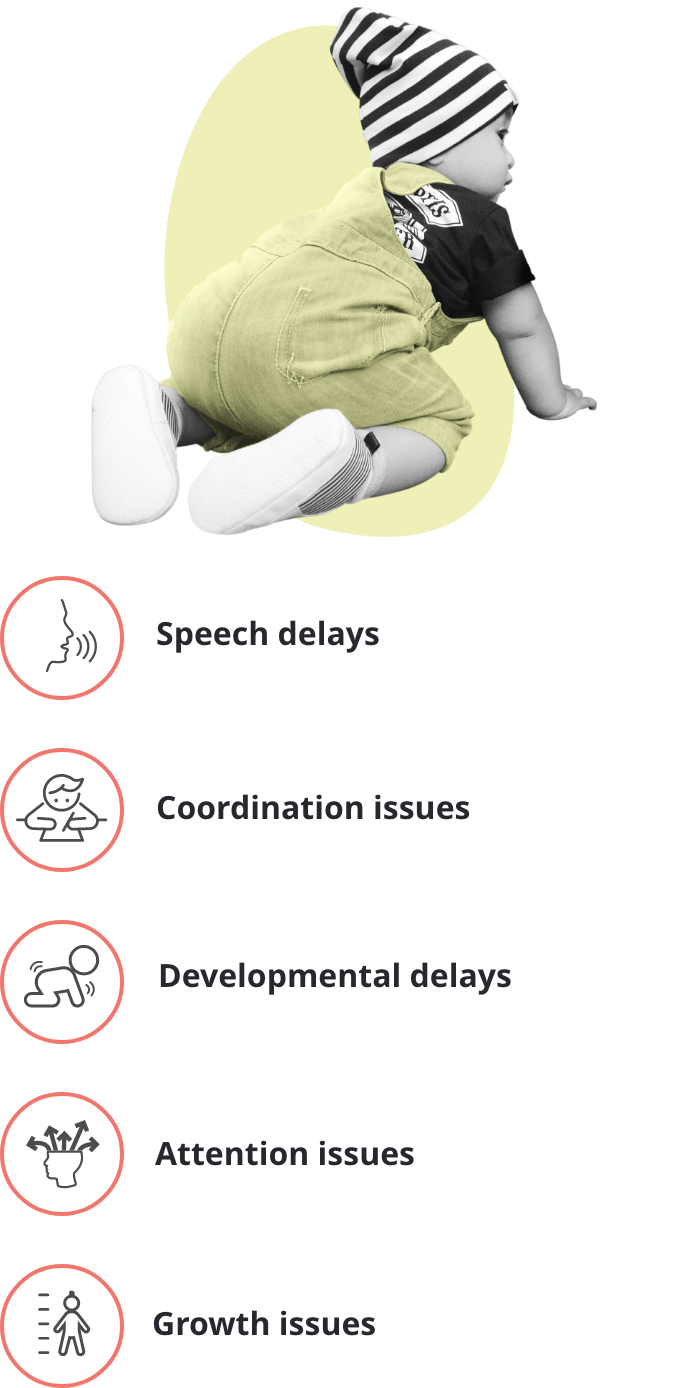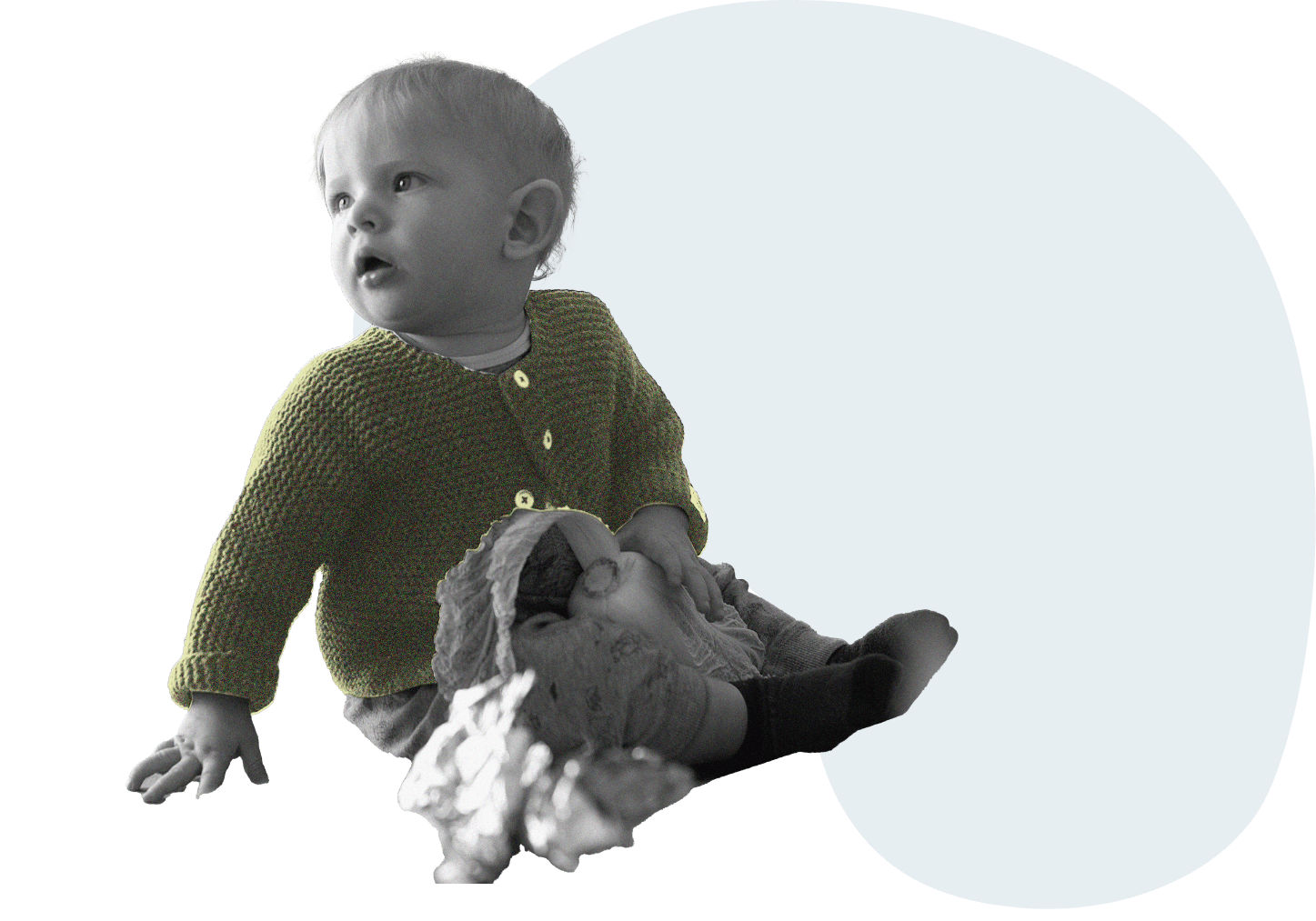This website uses cookies to help us give you the best experience when you visit and for certain analytics and marketing activities. By continuing to use this website, you consent to the use of these cookies. Please exit the website if you do not agree to such cookies being used. To find out more about how we use cookies, go to our Privacy Policy.
Caring for infants and toddlers with Galactosemia
(Ages 2 months to 4 years)
Galactosemia Symptoms
Symptoms of Galactosemia in infants and toddlers
At this point, you and your family have discovered so much together, and now you're settling into your new routine and making plans for the future. It's important to continue to be aware of potential new symptoms associated with Galactosemia.


How will I know if my little one is experiencing a Galactosemia-related developmental delay?
Every child's development is unique. However, there are some Galactosemia-related signs of delayed development—for example, apraxia or dysarthria (e.g., delayed language, inability to move lips or tongue to say words, slurred or mumbled speech)—that might indicate you should talk to your pediatrician.
Explore resources, including tips on talking to your doctor.
Resources
Talking to your doctor matters
Overall, children are 4 times more likely to have delays identified and be enrolled in early intervention programs when their parents discuss developmental concerns with their doctor.

Monitoring needs
Requirements for infants and toddlers
Health complications can show up early and may have a significant impact on development.

Continued blood testing
After diagnosis, your doctor will likely continue to test for increased levels of Gal-1p, or for levels of galactitol, throughout the first year of your child's life.
Testing for speech/language delays
Beginning around 7 months of age, it is generally time to have your child screened for possible speech or language issues.
A speech therapist may also administer a formal screening assessment that determines your child's capacity for speech.
Know Your Healthcare Team
Meet the team who may look after your toddler's health
Metabolic geneticist
These experts specialize in metabolic disorders. They help to coordinate the right care for your child with Galactosemia.
Dietitian
Your dietitian can offer lifelong advice on your child's diet. At this point, your dietitian can help you plan how to introduce your child to Galactosemia-friendly foods.
Pediatrician
This may be the pediatrician from when your child was first born or a new one—either way, they are trained to diagnose, treat, and provide ongoing care for a variety of childhood illnesses, both mild and severe.
Ophthalmologist
As your child grows, an ophthalmologist can check for cataract development caused by build-up of toxic galactitol.
Speech therapist
As your child learns to communicate, a speech therapist may be needed to help assess, diagnose, and treat issues with speech/language, communication, and swallowing.
Neurologist
A neurologist may be needed to help you diagnose, treat, and manage cognitive (learning, processing, and understanding) or motor delays due to potential complications from Galactosemia.
Galactosemia diet
Getting used to solids, food labels, and the world of feeding toddlers
Galactosemia may have an influence on certain milestones, particularly as it pertains to the adventure of new varieties and textures of baby and table foods, as well as self-feeding.
Click below for more information about a Galactosemia-friendly diet and reading food labels.
Learn More

Testimonials
Living with Galactosemia


Stay in the loop and get updates
Connect with Galactosemia Together:
References
- American Academy of Neurology. Tools and resources: what is a neurologist? Accessed October 8, 2020. https://www.aan.com/tools-and-resources/medical-students/careers-in-neurology/what-is-a-neurologist/
- American Academy of Pediatrics. Definition of Pediatrician. April 2015. Accessed September 22, 2020. https://doi.org/10.1542/peds.2015-0056
- Berry GT. Classic Galactosemia and clinical variant galactosemia. In: Adam MP, Ardinger HH, Pagon RA, et al, eds. GeneReviews®. (WA): University of Washington; February 4, 2000.
- Childhood apraxia of speech. American Speech Language Association. Accessed October 29, 2020. https://www.asha.org/practice-portal/clinical-topics/childhood-apraxia-of-speech/
- Dysarthria. American Speech Language Association. Accessed October 29, 2020. https://www.asha.org/public/speech/disorders/dysarthria/
- Johns Hopkins Medicine. Metabolic genetics clinic: my newborn received an abnormal screen. Accessed September 22, 2020. https://www.hopkinsmedicine.org/institute-genetic-medicine/patient-care/genetics-clinics/metabolic-genetics-clinic.html
- Matheis M, Estabillo JA. Assessment of fine and gross motor skills in children. Nature. 2018:468-484.
- Milestone Checklist. Centers for Disease Control and Prevention. Accessed October 29, 2020. https://www.cdc.gov/ncbddd/actearly/pdf/checklists/Checklists-with-Tips_Reader_508.pdf
- National Centre for Inherited Metabolic Disorders. Dietitians. Accessed September 22, 2020. http://metabolic.ie/about-us/dietitians/
- Potter NL. Voice disorders in children with classic galactosemia. J Inherit Metab Dis. 2011;34(2):377-385. doi:10.1007/s10545-010-9213-4
- Rajappa M, Goyal A, Kaur J. Inherited metabolic disorders involving the eye: a clinic-biochemical perspective. Eye. 2010;24:507-518.
- Raspa M, Levis DM, Doto JK, et al. Examining parents' experiences and information needs regarding early identification of developmental delays: qualitative research to inform a public health campaign. J Dev Behav Pediatr. 2015;36(8):575-585. doi:10.1097/DPB.0000000000000205
- Speech Language Pathologists: about speech-language pathology. American Speech Language Association. Accessed September 24, 2020. https://www.asha.org/students/speech-language-pathologists/
- Spoken Language Disorders. American Speech Language Association. Accessed September 24, 2020. https://www.asha.org/practice-portal/clinical-topics/spoken-language-disorders/
- Welling L, Bernstein LE, Berry GT, et al. International clinical guideline for the management of classical galactosemia: diagnosis, treatment, and follow-up. J Inherit Metab Dis. 2017;40(2):171-176. doi:10.1007/s10545-016-9990-5
